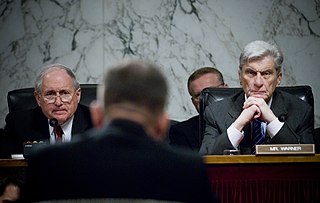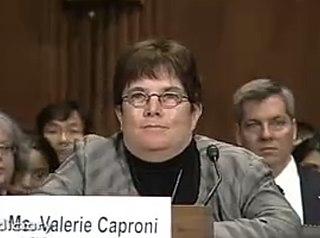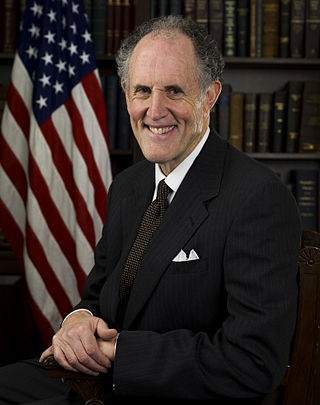
The federal government of the United States is the national government of the United States, a federal republic located primarily in North America, composed of 50 states, five major self-governing territories, several island possessions, and the federal district and national capital of Washington, D.C., where most of the federal government is based.
Contempt of Congress is the act of obstructing the work of the United States Congress or one of its committees. Historically, the bribery of a U.S. senator or U.S. representative was considered contempt of Congress. In modern times, contempt of Congress has generally applied to the refusal to comply with a subpoena issued by a congressional committee or subcommittee—usually seeking to compel either testimony or the production of requested documents.

A congressional committee is a legislative sub-organization in the United States Congress that handles a specific duty. Committee membership enables members to develop specialized knowledge of the matters under their jurisdiction. As "little legislatures", the committees monitor ongoing governmental operations, identify issues suitable for legislative review, gather and evaluate information, and recommend courses of action to their parent body. Woodrow Wilson once wrote, "it is not far from the truth to say that Congress in session is Congress on public exhibition, whilst Congress in its committee rooms is Congress at work." It is not expected that a member of Congress be an expert on all matters and subject areas that come before Congress. Congressional committees provide valuable informational services to Congress by investigating and reporting about specialized subjects.

The U.S. House Committee on the Judiciary, also called the House Judiciary Committee, is a standing committee of the United States House of Representatives. It is charged with overseeing the administration of justice within the federal courts, federal administrative agencies, and federal law enforcement entities. The Judiciary Committee is often involved in the impeachment process against federal officials. Because of the legal nature of its oversight, committee members usually have a legal background, but this is not required.

The United States Senate Committee on the Judiciary, informally known as the Senate Judiciary Committee, is a standing committee of 21 U.S. senators whose role is to oversee the Department of Justice (DOJ), consider executive and judicial nominations, and review pending legislation.
The following list outlines the structure of the federal government of Canada, the collective set of federal institutions which can be grouped into the legislative, executive, and judicial branches. In turn, these are further divided into departments, agencies, and other organizations which support the day-to-day function of the Canadian state.
U.S. Senate Appropriations Subcommittee on Commerce, Justice, Science, and Related Agencies, often referred to colloquially as the CJS Subcommittee is one of twelve subcommittees of the U.S. Senate Committee on Appropriations. It was formerly known as the Subcommittee on Commerce, Justice, State, and the Judiciary during the 108th Congress (2003–2005), but responsibility for the State Department and the federal Judiciary are now handled by separate subcommittees. The United States Senate Committee on Appropriations has joint jurisdiction with the United States House Committee on Appropriations over all appropriations bills in the United States Congress. Each committee has 12 matching subcommittees, each of which is tasked with working on one of the twelve annual regular appropriations bills. This subcommittee has jurisdiction over the budget for the United States Department of Commerce, the United States Department of Justice, and Science policy of the United States.
The United States Senate Judiciary Subcommittee on Competition Policy, Antitrust and Consumer Rights is one of eight subcommittees within the Senate Judiciary Committee. It was previously known as the Subcommittee on Antitrust, Competition Policy and Consumer Rights. The Subcommittee's counterpart in the House of Representatives is the House Judiciary Subcommittee on Antitrust, Commercial and Administrative Law.
The United States Senate Health Subcommittee on Employment and Workplace Safety is one of the three subcommittees within the Senate Committee on Health, Education, Labor and Pensions.
The Senate Judiciary Subcommittee on the Constitution is one of eight subcommittees within the Senate Judiciary Committee. The subcommittee was best known in the 1970s as the committee of Sam Ervin, whose investigations and lobbying — together with Frank Church and the Church Commission — led to the passage of the Foreign Intelligence Surveillance Act.
The Senate Judiciary Subcommittee on Criminal Justice and Counterterrorism is one of six subcommittees within the Senate Judiciary Committee. It was previously known as the Subcommittee on Crime and Terrorism
Congressional oversight is oversight by the United States Congress over the executive branch, including the numerous U.S. federal agencies. Congressional oversight includes the review, monitoring, and supervision of federal agencies, programs, activities, and policy implementation. Congress exercises this power largely through its congressional committee system. Oversight also occurs in a wide variety of congressional activities and contexts. These include authorization, appropriations, investigative, and legislative hearings by standing committees; which is specialized investigations by select committees; and reviews and studies by congressional support agencies and staff.
Christopher H. Pyle is a journalist and professor emeritus of Politics at Mount Holyoke College in South Hadley, Massachusetts. He testified to Congress about the use of military intelligence against civilians, worked for the Senate Judiciary Subcommittee on Constitutional Rights, as well as the Senate Committee on Government Oversight. He is the author of several books and Congressional reports on military intelligence and constitutional rights, and has testified numerous times before the U.S. Congress on issues of deportation and extradition.

The Arkansas State House of Representatives is the lower house of the Arkansas General Assembly, the state legislature of the US state of Arkansas. The House is composed of 100 members elected from an equal amount of constituencies across the state. Each district has an average population of 29,159 according to the 2010 federal census. Members are elected to two-year terms and, since the 2014 Amendment to the Arkansas Constitution, limited to sixteen years cumulative in either house.
The Administrative Law, Process and Procedure Project is a bipartisan undertaking of the Committee on the Judiciary of the House of Representatives of the United States Congress. It consists of a comprehensive study of the state of administrative law, process and procedure in the United States. A description of the Project was included in the Judiciary Committee's Oversight Plan for the 109th Congress, as approved by the Committee on January 26, 2005. The Project will culminate with the preparation of a detailed report with recommendations for legislative proposals and suggested areas for further research and analysis to be considered by the Administrative Conference of the United States (ACUS). House Judiciary Committee Chairman F. James Sensenbrenner, Jr. (R-WI) and Ranking Member John Conyers (D-MI) requested the Congressional Research Service (CRS) to assist Representative Chris Cannon (R-UT), the Chairman of the Subcommittee on Commercial and Administrative Law (CAL), in conducting the Project.
United States Intelligence Community Oversight duties are shared by both the executive and legislative branches of the government. Oversight, in this case, is the supervision of intelligence agencies, and making them accountable for their actions. Generally oversight bodies look at the following general issues: following policymaker needs, the quality of analysis, operations, and legality of actions.

Valerie Elaine Caproni is a United States district judge of the United States District Court for the Southern District of New York.

Edward Emmett Kaufman is a retired American politician and businessman who served as a United States senator from Delaware from 2009 to 2010. He chaired the Congressional Oversight Panel for the Oversight of the Troubled Asset Relief Program; he was the second and final person to hold the position, succeeding Elizabeth Warren. Kaufman is a member of the Democratic Party and key ally of President Joe Biden.

The Administrative Procedure Act (APA), Pub. L.Tooltip Public Law 79–404, 60 Stat. 237, enacted June 11, 1946, is the United States federal statute that governs the way in which administrative agencies of the federal government of the United States may propose and establish regulations, and it grants U.S. federal courts oversight over all agency actions. According to Hickman & Pierce, it is one of the most important pieces of United States administrative law, and serves as a sort of "constitution" for U.S. administrative law.

The All Circuit Review Extension Act is an Act that extended for three years the authority for federal employees who appeal a judgment of the Merit Systems Protection Board (MSPB) to file their appeal at any federal court, instead of only the U.S. Court of Appeals. This was a pilot program established in the Whistleblower Protection Enhancement Act of 2012 to last only two years.







